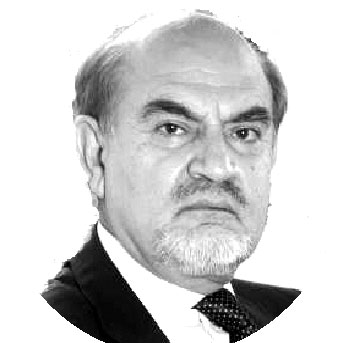Raza Muhammad Khan
PAKISTANI Constitution alludes to the jeopardy against itself as high treason, though this phraseology usually portrays putting the country in danger by helping the enemies. Apart from actions like abrogation and suspension etc., Article 6 brackets subversion of the constitution as well, with the said crime. The political concept of subversion essentially refers to disloyalty to, or repudiation of the guiding principles of the constitution, which are outlined in the Objectives Resolution; that became a substantial part of the Constitution in 1985. The Resolution proclaims a dozen tenets, but this treatise shall consider only five, that are usually sullied. First; while the state has been empowered to exercise its power and authority through chosen representatives, the concept of sovereignty is conditional: ‘Sovereignty belongs to Allah Almighty alone and the authority which He has delegated to the state of Pakistan, through its people for being exercised within the limits prescribed by Him, is a sacred trust’.
Thus, all claims about absolute sovereignty of Parliament or actions that flow from this assumption would be treasonous. As Pakistan is indeed a blessed and precious inheritance, whatever weakens the state or this essential argument, will also be perfidious. At this point, let’s defer any judgement if the nature of some of our recent politics is a breach of this trust. Second; ‘the principles of democracy, tolerance etc., is to be fully observed’. This edict is frequently flouted, which has consequently led to acute polarization, interruptions in our democratic history and permeation of extremism in the society as well. Third; ‘fundamental rights like freedom of thought, (and) expression are guaranteed, but subject to (the) law and public morality’. Thus, unbridled public statements that hurt the country’s image and interests, embarrass, discredit or falsely implicate Pakistan’s security apparatus (like the ones by a former PM about 2008 Mumbai attacks in the past, and blaming state institutions without evidence), or undermining our deterrence capability (like the false statement by a former NA Speaker), seem seditious.
‘Public morality’ refers to ethos accepted in a society, like good character, honesty, moderation etc. It also includes avoiding profanity against opponents, respect for national heritage and mausoleums. Also included are decency, civility and truth in public proclamations, without which, the entire edifice and conduct of politics, whether local, national or international, is tarnished. Similarly, the private life of politicians and public office holders also belongs to this domain. Freedom of the media and speech is also bound by this matrix and any violation of these values is universally despised, necessitating apologies, voluntary resignations from public and private high positions and retribution. But this is uncommon in Pakistan. Fourth; the Resolution categorically enunciates that ‘The Muslims shall be enabled to order their lives in the individual and collective spheres in accordance with the teachings— of Islam—-’.While there is emphasis on the obligations of the Muslims towards God, at the places of worship; our politico-religious pulpits, seldom preach about duties and responsibilities towards fellow citizens, obedience of laws and reverence for life, property, honour and rights of others. Finally, what can be labelled as the ‘raison d’être’ or the national aim has been appropriately stated: ‘the people of Pakistan may prosper and attain their rightful and honoured place among the nations of the world and make their full contribution towards— peace, progress and happiness’.
It is agonizing to note that so far, this lofty purpose remains unheeded, for the following reasons: Many of our elected demagogues, who were chosen for a better future of the voters, are either oblivious of the Objectives Resolution or they have forgotten their responsibilities to implement their constitutional obligations. The rule of the ‘demos’ or people is also unreal in our democracy, as the gulf between the rich and the poor is wide and since most voters take their cue from the media, which could be deceptive. Today the people are unable to reckon with the real agenda and drivers behind actions that may provoke clashes among the state institutions, though deflection of attention from accountability could be a motive. Thus, the crucial questions are; how can the constitution be upheld when its guiding principles are corroded? Are the recent political spectacles that could endanger the state and democracy, not subversive as intended in Article 6? Is the enactment of the 18Amendment that made more than 100 changes, many of them crucial and revised approximately 36 percent of the constitution, without any parliamentary debate, liable for the current predicament and is it beyond reproach? These questions need answers, so that constitutional benefits can accrue, not through mere written terms, but by a selfless adherence to its principles.
Nonetheless, the immediate concern is the protection of the state and the constitution, from threats of the use of force against the government, propagation of fake narratives and violation of Article 63(1)(g), by defamation and ridicule of the judiciary and the defence forces by some politicians and facilitation of this by our known enemies. We must remove these contradictions or else democracy could crumble or morph into a façade. Earlier, there was a remedy: the National Security Council, (distinct from the present National Security Committee) but that was scuttled. It could be revived after suitable reorganization. However, without upsetting the balance of power among the troika of the government, parliament and the Judiciary, it is imperative to address these matters through the Supreme Court or a special statutory tribunal, to preclude and restrain subversion of the constitution. Another choice is to emulate Germany, which has a Federal Office for Constitutional Protection, comprising thousands of staff, that works with its intelligence and security services and monitors anti-constitutional activities, by domestic and foreign detractors. Perhaps this could correct decades of deceptive discourse about our democracy and improve its image of a mere glamorous label for the way politicians are elected, rather the way they rule and act.
— The writer, a retired Lt Gen, is former President of National Defence University, Islamabad.









